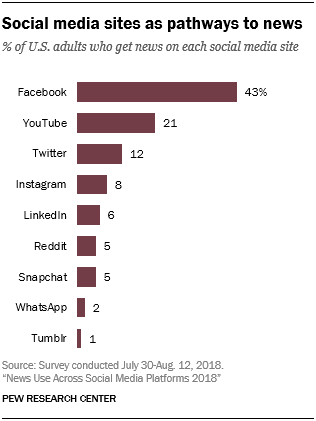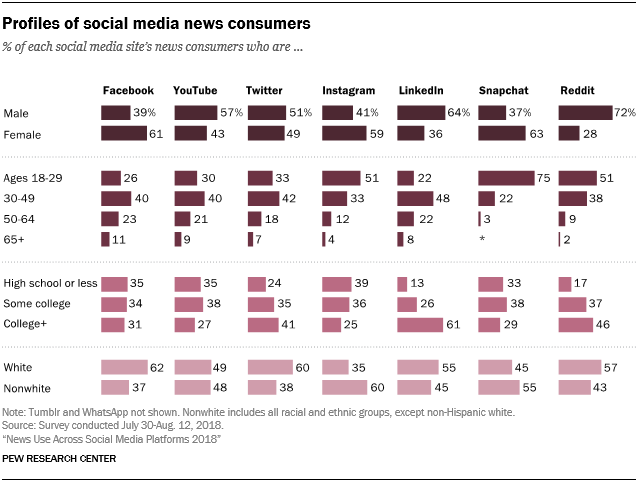Where Americans get their news on social media (and why that's a problem)
In a new interview with the New Yorker, Facebook (FB) CEO Mark Zuckerberg said he gets the news from “aggregators. … There’s really no newspaper that I pick up and read front to back.”
This is also the case for a many Americans in the U.S. today, largely thanks to Facebook’s News Feed.

According to a new survey from the Pew Research Center, which spanned July 30 to August 12 and polled 4,581 U.S. adults, “two-thirds of American adults (68%) say they at least occasionally get news on social media.”
But even though most Americans get news from social media, the survey found that 57% also “say they expect the news they see on social media to be largely inaccurate.”
Facebook is the most popular place to get news on social media, with 43% of Americans getting news from the platform. YouTube (21%), Twitter (12%), Instagram (8%), LinkedIn (6%), Reddit (5%), and Snapchat (5%) rounded out the big players.

Fake-news, frauds, and hoaxes
In an era of instant gratification, social media’s rise as a dominant news source is expected. The most popular thing people like about social media is the convenience, which 21% of consumers listen as their favorite thing. (Other convenience-minded answers that got high marks included the speed, the format, and customization.)
But what often occurs on these platforms — particularly YouTube — is that users get caught in a feedback loop of bias-confirming content.
Furthermore, the last couple of years show that Facebook, YouTube, and Twitter are prime targets of state-backed misinformation campaigns, hoaxes, frauds. And when Pew asked what concerned American news consumers about information on social media, inaccuracy topped the list (31%), followed by partisanship (11%), quality (10%), and the behavior of other users (8%).

And so, despite the convenience and widespread use, many Americans told Pew that they do not see themselves as more knowledgeable about current events. Only 36% said it improved their understanding while 48% said it didn’t make a difference. And for an unfortunate 15%, news consumption from social media only served to flummox.
Breaking down the demographics
Pew’s demographic breakdown in the survey paints a picture of the demographics for news consumers on the various social media platforms. LinkedIn and Reddit news consumers had the most schooling (as well as being mostly male).

Reddit, Twitter, and Facebook have much more of a news focus for its users, the survey found. 67% of Facebook users, 71% of Twitter users, and 73% of Reddit users get their news from those individual platforms, respectively.
–
Ethan Wolff-Mann is a writer at Yahoo Finance focusing on consumer issues, retail, personal finance, and more. Follow him on Twitter @ewolffmann.
Read more:
The most and least affordable U.S. metro areas to buy a house
The top 10 innovations that could shape the next decades: Citi